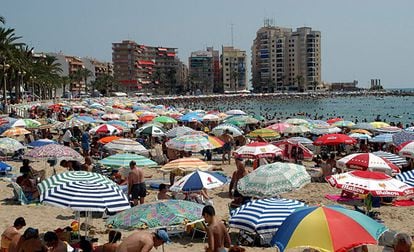Is tourist resort Torrevieja really Spain’s poorest town?
Official data shows average household income in Alicante municipality is just €7,986 a year


At first sight, you wouldn’t think that Torrevieja was the poorest city in Spain.
Yet just a few days ago, the National Statistics Institute (INE) reported that the popular beach resort at the southern end of the Valencia region has the lowest household income in the country, with an annual average of €7,986.
The figure is part of a study that analyzed 109 Spanish municipalities as part of the European Union’s Urban Audit project.
But Torrevieja is a town full of contrasts. It has low-income areas and a large marina filled with recreational vessels. It attracts low-earning Spanish visitors and foreign tourists who spend most of their time inside their luxury estates, reading foreign newspapers that they can afford to buy at the local press stands.
By the time a neighbor alerts the authorities about an elderly person’s death, more often than not they’ve been dead for weeks”
Torrevieja Mayor José Manuel Dolón
Experts and local authorities are not surprised that Torrevieja shows up at the bottom of the household income chart. But they believe that the real income level here is higher than the one that shows up in the official figures, which are being distorted by Torrevieja’s special characteristics. The INE admits that this is possible.
For one thing, the town’s economy is markedly seasonal. “There’s only work here in the summer,” says Arlene Alarcón, 33, standing outside the store where she works for €800 a month selling beach articles. “You get through the winter by collecting unemployment checks or subsidies. There’s no industry or any other kind of jobs.”
“There’s quite a bit of poverty around here,” agrees Miriam Arranz, 37, a waitress at a local pizzeria. “You see quite a few kids whose parents cannot afford their school books or cafeteria service, and families where every single member is unemployed.”
“The city used to rely a lot on construction, and that went bust,” she adds. “And the hospitality sector is not doing well. This is July, and just look at these places: they’re half empty because people don’t have enough money to go out for a Coke.”
A lot of sidewalk restaurant tables on the seaside promenade are indeed empty at lunchtime, despite the offers on display. One restaurant with sea views has a three-course menu, drink included, “starting at €6.55.”
Distorted data?
The INE measures household income by crossing a municipality's tax returns with a household estimate based on the census and the Active Population workforce survey.
A spokeswoman for INE admitted that in municipalities on the Mediterranean coast and the islands these results could be skewed "by the fact that they have a high percentage of foreign residents who do not file their taxes in Spain but in their countries of origin."
Carlos Cruzado, president of the Tax Agency employees union Gestha, and Ángel Sánchez, a professor of applied economics, add that the underground economy that is tied to the hospitality industry, including informal holiday apartment rentals, may also have pushed the official household income figure below the real numbers.
In the early 1980s, there was a Spanish television game show called Un, dos, tres – subsequently exported to the UK as 3-2-1, hosted by Ted Rogers – that handed out apartments in Torrevieja to the winning contestants. This made the city hugely popular among Spaniards.
These days, the residential estates are strewn throughout city limits “without any kind of order,” according to the new mayor, José Manuel Dolón of green party Los Verdes. Like many other municipal and regional governments that have switched to leftist administrations since the recent May 24 elections, Torrevieja’s new government has ended 27 straight years of rule by the conservative Popular Party (PP).
Torrevieja has 165,000 housing units, most of them grouped in low- and medium-height buildings. The registered population is 99,600, half of whom are foreigners.
In the late 1970s, the surrounding salt marshes employed 700 people, but now only 50 or so workers remain.
“The real industry around here was building cheap homes,” says Fanny Serrano, a Socialist councilor and a future mayor of the town, in accordance with a five-way agreement made between local political groups following the elections.
“This is one of the few Spanish cities where there are actually more holiday homes than primary residences,” notes Ángel Sánchez, an economics professor at Alicante University.
It hasn’t helped the city’s reputation to have news reports published about mafias, particularly Russian ones, operating out of Torrevieja. But Fanny Serrano feels that such stories are more urban legend than reality.
“What’s true is that it is easy to hide here if the authorities are looking for you,” she notes. “There can be up to three streets with the exact same name around here, and even the local police lose their way in the maze of residential estates. Disappearing in Torrevieja is the easiest thing in the world.”
In 1991, the city had 25,000 residents. Two decades later, the local rolls put the total close to 100,000. The father of this expansion was Pedro Ángel Hernández Mateo, mayor between 1988 and 2011, and now in jail for corruption. Two other criminal cases against him are still pending.
In order to encourage growth, the former mayor rezoned the land, declaring all of it fit for building save for the two lagoons, which were designated natural parks in 1989 and are home to as many as 2,000 flamingos.
Hernández Mateo also introduced a subsidy system by which people received up to €3,000 for registering as local residents, recalls Josep Antoni Ybarra, a university lecturer specializing in local urban development.
And so Torrevieja developed “an economic model that was not tourist-based but resident-based,” says Ybarra. Even though the population nearly triples in the summer, there are just a handful of hotels in town. “The only businesses that really do well around here are the supermarkets,” adds Ybarra.
The combination of sunny weather (just 17 days of rain fell in all of 2014), houses for as little as €30,000, and cheap flights to Alicante airport attracted many foreigners, and these days it is common to see posters and billboards in both English and Russian across town.

Torrevieja pulls in middle-class Europeans who come for the golf and the sun, but also Spaniards “who could not afford to buy an apartment in Madrid, Bilbao or Asturias, but saw that they could buy one here, and moved in,” says the mayor.
The same thing happened to some of the foreign residents, especially working-class Britons. “They bought the house by capitalizing on their retirement, and were left with monthly pensions of €1,000 or less,” says Dolón, who dealt with some of these residents during his time as a bank employee. He says that in some residential estates, the British community has created “food banks” where the less fortunate among them can eat for a couple of euros.
Another Torrevieja particularity is the large amount of elderly people who live here alone, especially foreigners with no relatives to look after them. This means that every year, between 30 and 60 local residents are found dead in their homes.
“By the time a neighbor alerts the authorities, more often than not they’ve been dead for weeks,” says the mayor. “In this as well we must hold a Guinness World Record of some kind.”
Translation by Susana Urra.










































